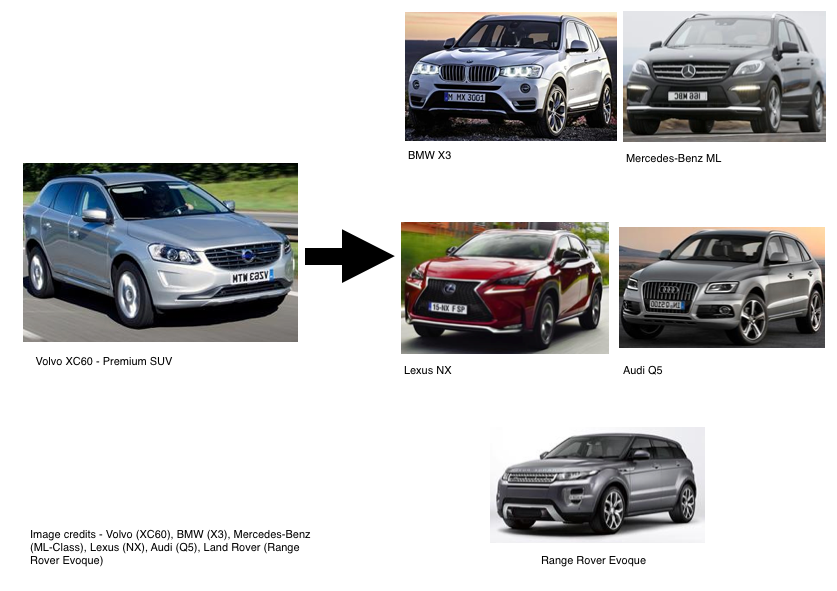Thanks to a combination of a unique and relentless pursuit of safety, and the firm only ever chasing mainstream success under its infamous Ford ownership, Volvo's 'rivals' all but died out with Saab. It can be argued that Volvo's pricing and quality place it in league with the premium sector (the domain of Audi, BMW and Mercedes), yet terms such as 'competition' and 'rivals' seem too aggressive when discussing those who Volvo shares a market with. If the car market was analogised as a battlefield, Volvo would be an intellectual strategist.
Above: the stomping ground of 'the big three', the executive saloon market is tight and distinct.
Why intellectual? Because Volvo's safety and efficiency-first policies deal with a niche which the 'big three' de facto rivals of Volvo prioritise lower down the list of attributes with which their brand is associated. For Audi, the priority is: "sportiness, progressiveness and sophistication". For BMW, it's: "Sporting and dynamic performance combined with superb design and exclusive quality", while Mercedes' is, more vaguely: "Reject compromise, protect what matters, honour a legacy, consider every detail, take responsibility, and outperform expectations." By putting a vast amount of resources into development of genuinely innovative safety features, as well as putting in a conscious and palpable effort to downsize engines in the interests of lowering emissions; mopping up all the customers that the above (arguably) forget.
Above: where before Audi was Volvo's only competitor in these markets, there are seemingly new entries every year.
And why a strategist? Because Volvo, rather than chasing customers with relentless advertising campaigns, PR schemes and other expensive media, instead chooses to innovate their marketing strategies; pulling out of the majority of motor shows and focusing upon the three most relevant to the Volvo brand - Detroit, Geneva and Beijing, representing the three most important markets to Volvo. Following the overwhelming success of the first edition of the new XC90 which sold all 1927 examples in just 47 hours online, Volvo is working on expanding and improving its online and social media activity and services.
Above: 'rivals' to the V40 premium hatchback. Below: subtle differences bring in an entirely different class of competitor.
Semantics aside, Volvo's range spans across eight highly-competitive, premium-sector classes of car, with more variants in each class, and numerous competitors in each sector, see the diagrams adorning this post. In this period of change, it is possible that even more competitors will emerge and attempt to share the same market space as Volvo and its already plentiful rivals. As other brands shift upmarket, as Volkswagen seems to be doing, and Volvo continues to produce sector- and segment-spanning models like the V40 Cross Country (above), Volvo could see its competitors sharply increase.
Above: the XC60's market is rigidly ruled by 'the big three', with no blurring of niche boundaries.
There is no doubt that the coming years of Volvo while its Chinese ownership is still in its infancy, it faces challenges as yet unknown in their number but perfectly clear in their manner: exactly how big will Volvo's market share be? Progressive sub-brands like BMW's 'i' lineup certainly seem to be closing the disparity between the brand values of all the major players in the market and indeed across the industry, and quite what impact this will have on Volvo's market share is, for the moment, unclear.
Above: the XC90 faces ferocious competition in one of the most crowded markets Volvo competes in.
Above: in one of the UK's bestselling markets, Volvo is without a doubt a left-field option.
http://www.audi.com/corporate/en/company/corporate-strategy.html
http://retailindustry.about.com/od/retailbestpractices/ig/Company-Mission-Statements/BMW-Group-Mission-Statement.htm
http://retailindustry.about.com/od/retailbestpractices/ig/Company-Mission-Statements/Mercedes-Benz-USA-Mission-Statement.htm
http://www.volvogroup.com/GROUP/GLOBAL/EN-GB/VOLVO%20GROUP/VISIONMISSION/PAGES/VISION.ASPX
http://www.autoexpress.co.uk/volvo/89801/volvo-to-shun-future-motor-shows
http://www.businessweek.com/articles/2014-06-26/volvo-seeks-u-dot-s-dot-sales-revival-with-return-to-swedish-roots
Interview material: original content obtained via email interview with M. Bayntun








No comments:
Post a Comment